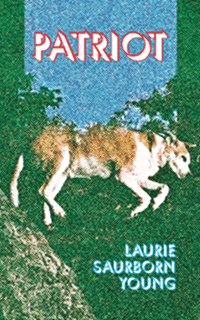 Patriot
Patriot
by Laurie Saurborn Young
Forklift, Ohio
32 pages / $5 Buy from Forklift, Ohio
Laurie Saurborn Young’s chapbook, Patriot, is a book of horizons, a book of lines – “of thunderstorms on the weather map,” of women on treadmills, of two hundred beer cans on the wall of a fourteen-year-old, of water towers and shuttered factories, of fighter planes above a parking lot in New England, of telephone poles and road kill, of “voters turned away.” The poems, thirteen total, each composed of twenty-six double-spaced lines, are each named “Patriot,” the same name as the book. This formal orderliness, along with the speaker’s measured yet persistent voice and the rank-and-file American subject matter, is in wonderful counterpoint to the great chaos of America inside the chapbook’s stapled pages. The speaker struggles to expand the definition of America, of course; but these are not Whitmanesque poems. Instead, there is a fierce constriction both in the music and imagery of these often-heavily enjambed lines, which create a shard-like collage of “America,” the place where the speaker struggles to locate herself.
The speaker of Patriot is decidedly female, and the theme of misogyny runs throughout the chapbook. The recurring image of the voting booth during an election year helps establish a sense of national urgency, and reminds the reader, specifically, of the 2012 presidential election, in which women’s rights were in the political spotlight, as right-wing politicians attacked the rights of women on multiple fronts. The speaker says, “Still throwing women in the water to see if is America.” Here, as in many of the lines of these poems, the poet uses epistrophe to delay the phrase we come to expect: “is America.” It’s a kind of reversal of Ginberg’s “America,” and gives the poems a much more feminine, feminist energy. The poems are bold, but they are not cocky or smug. They are not shouting at us. The inverted syntax and enjambments allow us to hear the internal voice of an American woman who feels genuine fear for her safety and her rights. The labyrinthine twists and turns in these poems are like a skier on a slalom – which is the exact metaphor Polish director Kristof Kieslowski used to describe what is was like to make films subject to strict censorship. In fact – and surprisingly – Kieslowski said that censorship helped him make better films. While Young’s poems are not subject to state censorship, we can hear the anxiety of utterance in this voice. These poems may at times sound cautious, but they are not afraid. On the contrary, they speak with candor, a seething anger, great intelligence, and a mesmerizing lyricism.
Ultimately, the poem “Patriot” – if we can read this book as a long poem, which starts and stops, starts and stops – is a question about America’s future. “What else but Eastern daffodils, mountain/ Laurels in wet spring?/ But the conversion of America into a stained/ Glass bank, thick with light?” The contradictions cannot be resolved. “Never answer because an answer is not the point,” the speaker says elsewhere. The rural, both in the speaker’s memories of childhood and in the present tense, and the American city, filled with its hospitals and parking lots and drug dealers at stop lights, don’t just co-exist side by side in these poems; rather, they seem, like the present and the past, to overlap, to be transposed on top of each other. Thus one of the reasons for the somewhat claustrophobic feel of the poems. The speaker says, “Somewhere I am eighteen and somewhere I still/ Plan to get drunk and pass out then suddenly/ Awake nearly twenty years later to find/ You still means Men in the audience.” Unaddressed, not seen except as a female body that can be controlled by men, or a demographic speck by some think tank or PAC, the speaker elsewhere says, “This is America and I am still waiting to be taken/ Out of context.” The irony of the last phrase is painful: the speaker has yet to be seen outside the context of gender (and race, and economic status, etc.), but the phrase also means that the speaker’s words have yet to be isolated, as in a quotation worthy of printing ink or cyberspace, or something simply worth listening to, or remembered. The question of the power of the speaker’s voice haunts the book by the end, and the final lines read: “Lines disintegrate and it is ever so late./ After she voted she took her body she took it back home.” The “lines” here are the lines of people at the voting booth near the end of the election, before the future of America has been decided. The lines are also the lines we are reading, the lines of the poem, as they have said what they can say and now are gone. By the end, the speaker has not just performed a civic, patriotic duty: she has taken care of herself, wearied and resilient. Patriot is a song America needs to hear.
***
Justin Bigos works as a cook in Flagstaff, Arizona. His poems have recently appeared in New England Review, Driftless Review, Four Way Review, Slice, and iO. His interviews and reviews have appeared online in 32 Poems and the American Literary Review. With Kyle McCord, he co-founded the Kraken Reading Series, based in Denton, TX.
Tags: Justin Bigos, Laurie Saurborn Young, Patriot
